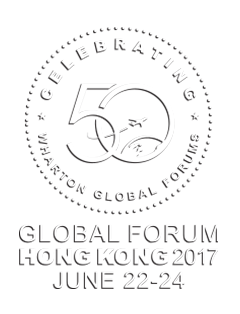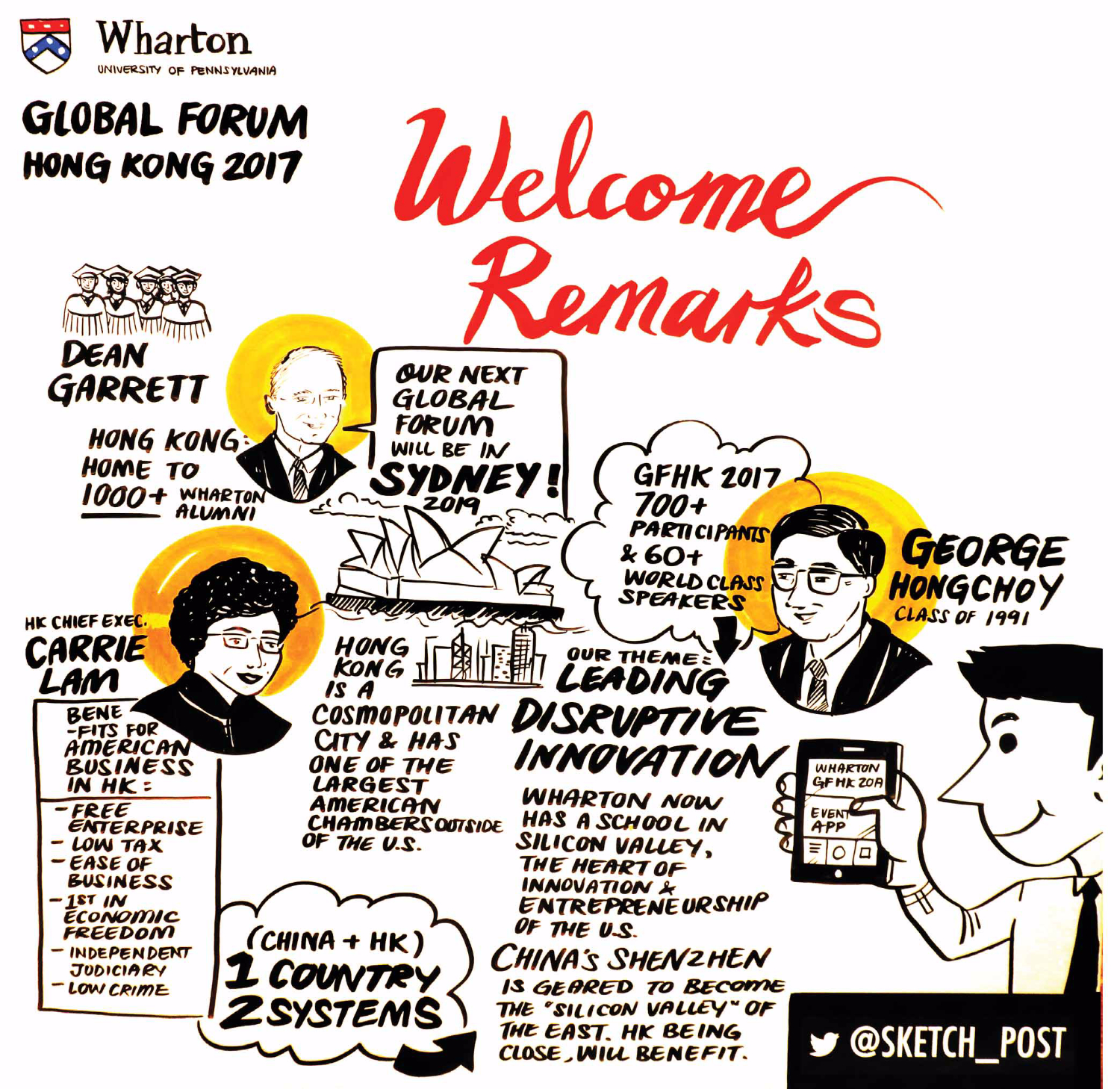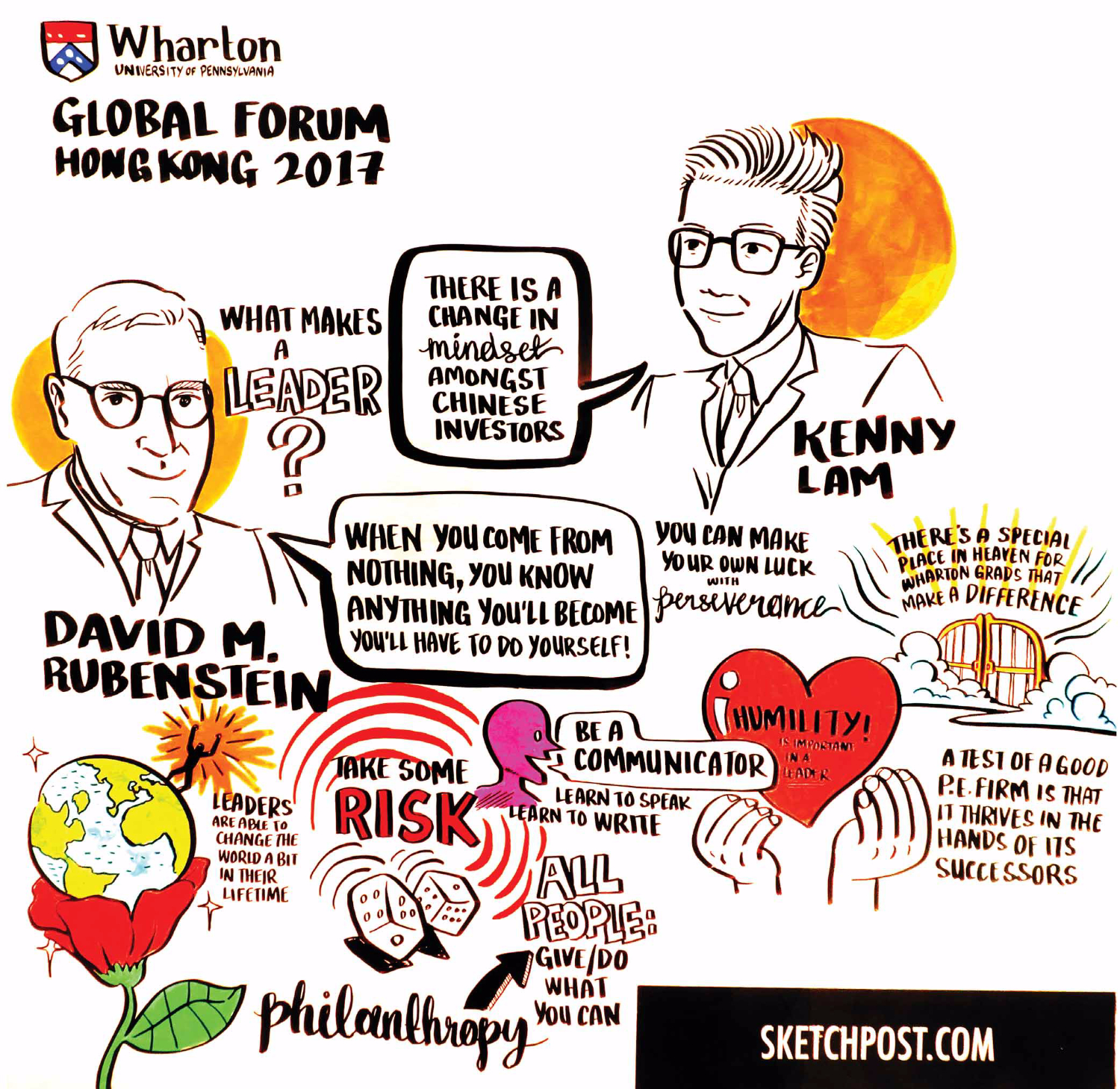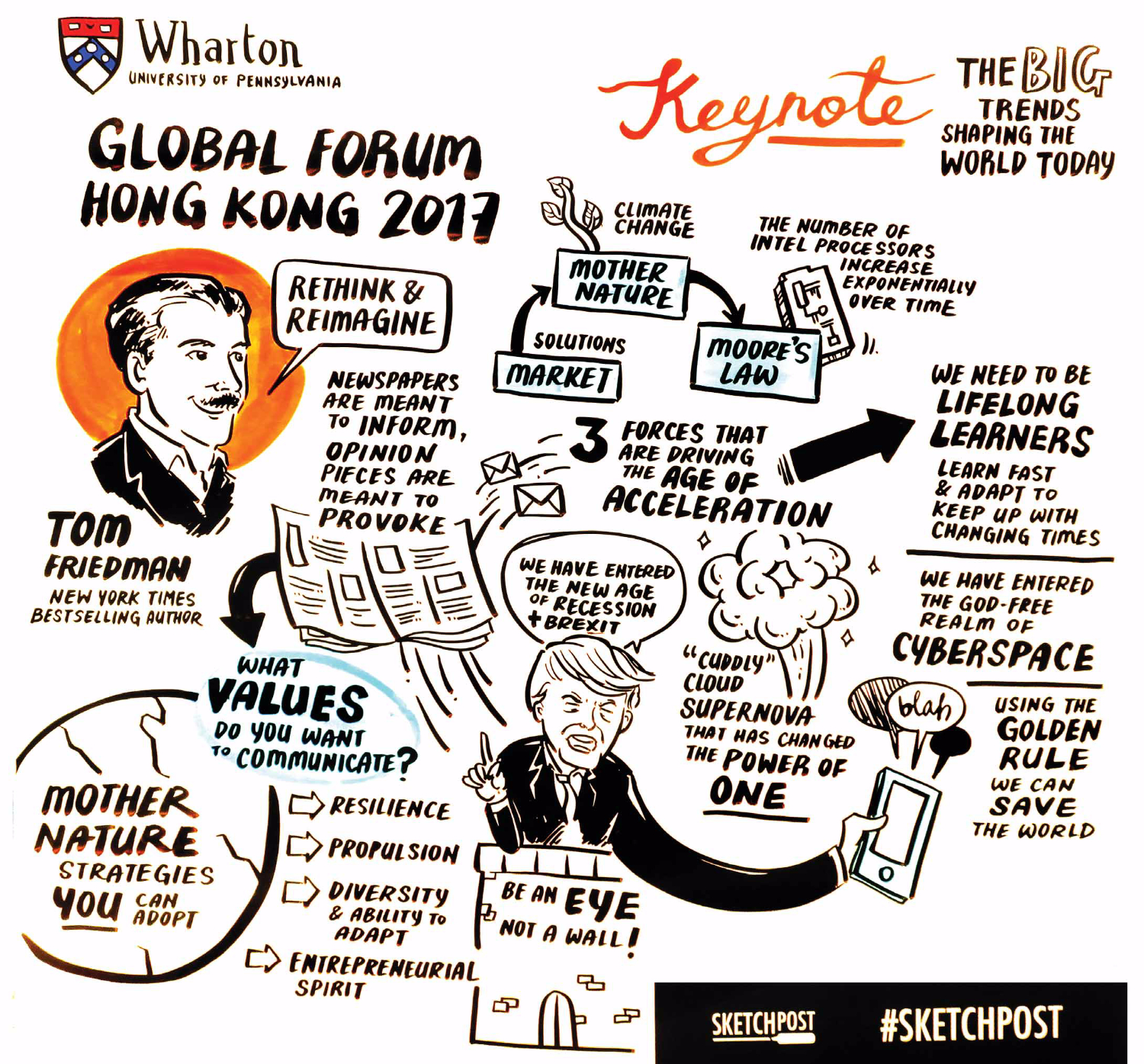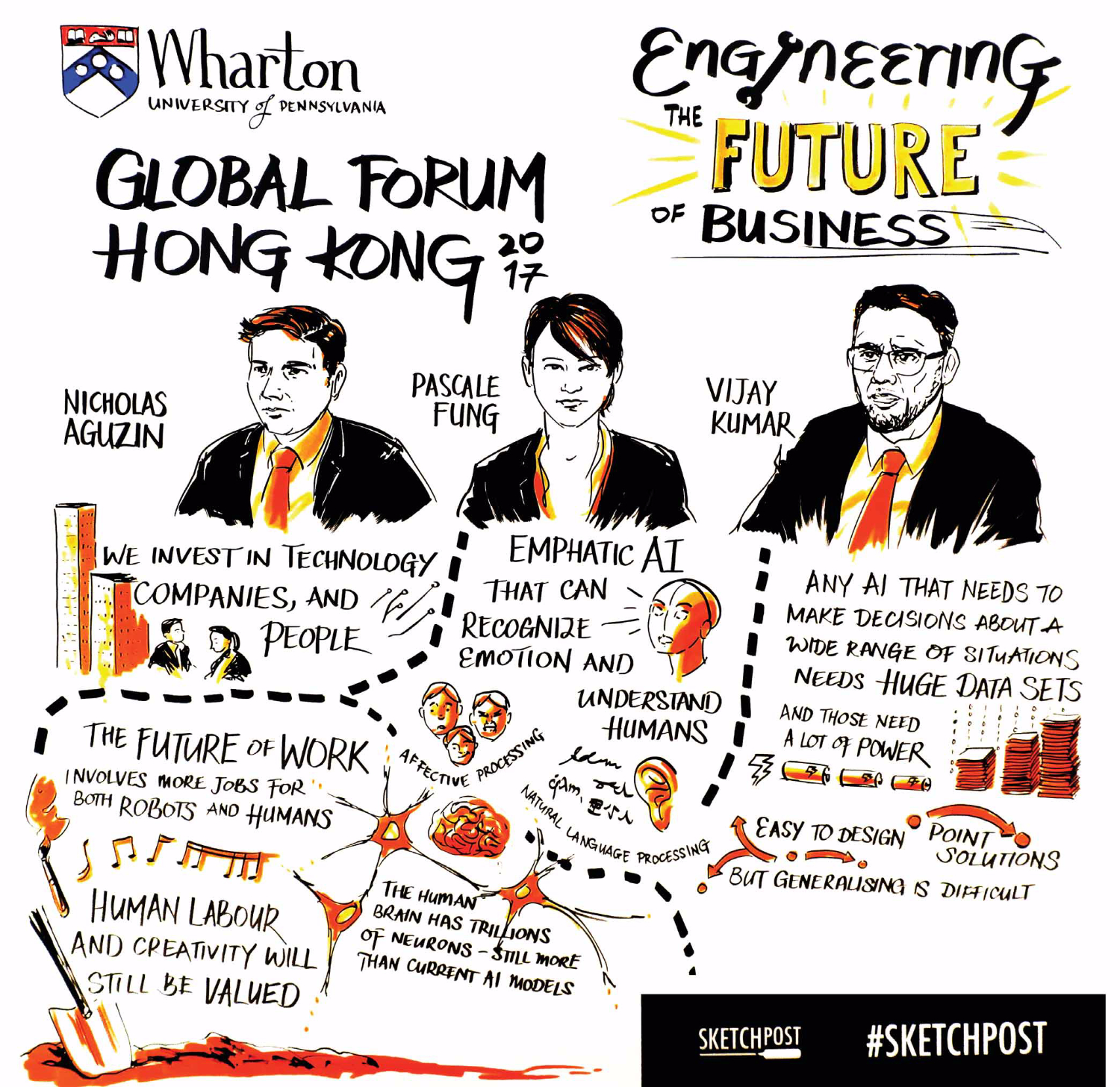Wharton Global Forum Keynotes:
Quick Takes on Big Ideas
Keynotes by heads of state, industry innovators, and intellectuals at the top of their game are hallmarks of any Wharton Global Forum. “The School is magnetic for really interesting people,” says Wharton Dean Geoffrey Garrett. We’ve compiled a quick glance at some of the keynote sessions from Hong Kong to illustrate the Forums’ international impact.
For even more detail, check out the accompanying infographics hand illustrated at the Forum in real time by SketchPost.
Connectivity, Collaboration, and Competition
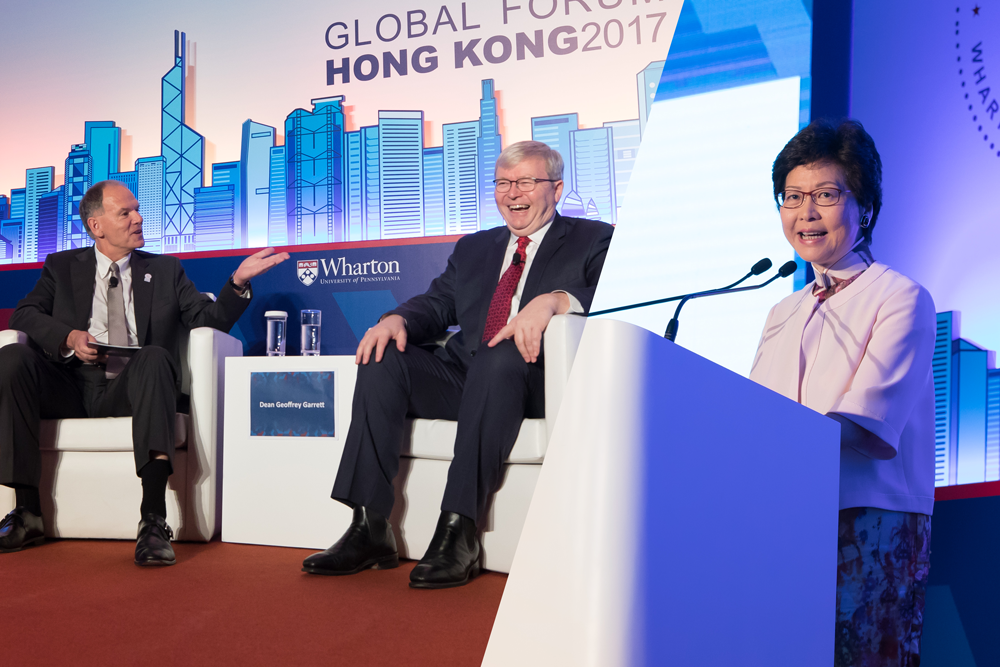
Speakers:
- Geoffrey Garrett, Dean and Reliance Professor of Management and Private Enterprise, The Wharton School
- Forum Organizing Committee Chairman George Hongchoy, WG’91, PAR’18, PAR’21, Executive Director & Chief Executive Officer, Link Asset Management Limited
- Carrie Lam, GBM, GBS, Chief Executive-elect, Hong Kong Special Administrative Region, People’s Republic of China
- Kevin Rudd, Former Prime Minister, Australia (2007-2010, 2013), President of the Asia Society Policy Institute
Opening Plenary and Keynotes
Just days before she was scheduled to officially assume the role of Chief Executive of Hong Kong, Carrie Lam painted a picture of a vibrant international center of commerce whose ambitions loom large in coming years. “We make it easy for people to do business,” Lam said. “We believe in the right to free enterprise,” stressing that the territory will make significant investments into education, technology, and arts and culture.
While Hong Kong and the Asian hemisphere pursue economic growth full steam ahead (the massive Belt and Road infrastructure initiative is a prime example), the U.S. must do some soul searching, according to former Australian Prime Minister Kevin Rudd. “I think what our cousins in Washington don’t understand is one word: scale,” Rudd told Wharton Dean Geoffrey Garrett. “China is bloody big…[and] always muddles through tough times. They have a lot of experience in doing that.”
Trends and Best Practices in Global Investing
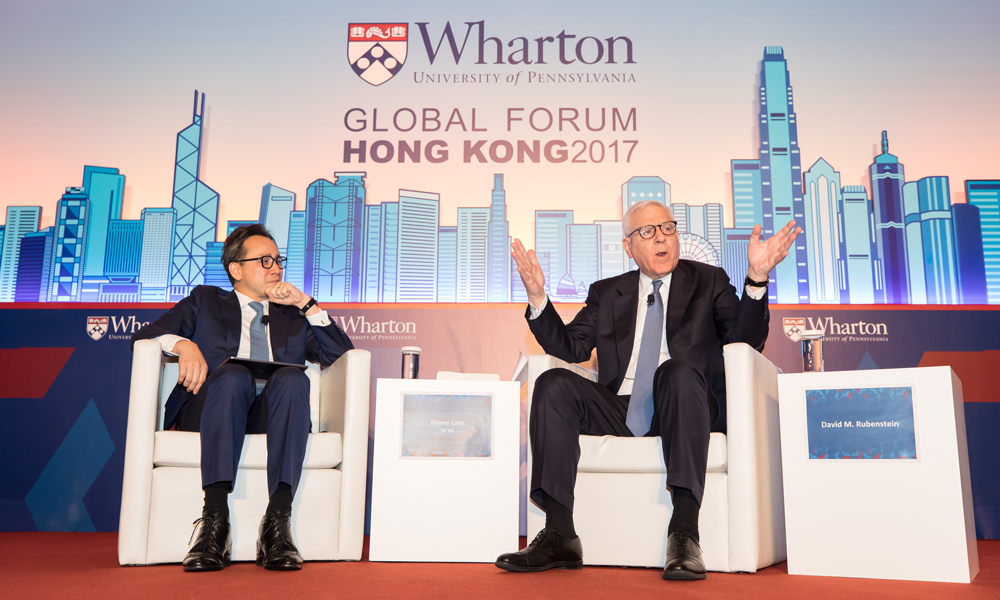
Speakers:
- Kenny Lam, W’96, Group President, Noah Holdings, Ltd.
- David M. Rubenstein, Co-Founder & Co-Chief Executive Officer, The Carlyle Group
Global Investment Landscape, sponsored by Noah Holdings, Ltd.
The Chinese investment landscape is evolving at a remarkable pace, with Chinese investors becoming more open to family offices and portfolio managers to maximize profitability. “China today is like the United States in the 1970s and 1980s, but accelerating at a much faster rate,” noted Noah Holding’s Kenny Lam, saying that the current environment favors investors.
David Rubenstein of the Carlyle Group invests in companies that have high-performing, nimble management teams and a proven ability to endure volatility and survive leadership transitions. Sectors appealing to the Chinese middle class like health care, consumer products, and financial services are particularly appealing. But, he advises, don’t discount the value of so-called softer qualities. “Everyone has some luck,” he said. “The greats don’t take no for an answer. They also made a lot of their luck.”
“Lifelong Learning Will be 50% of What a School Like Wharton Does”
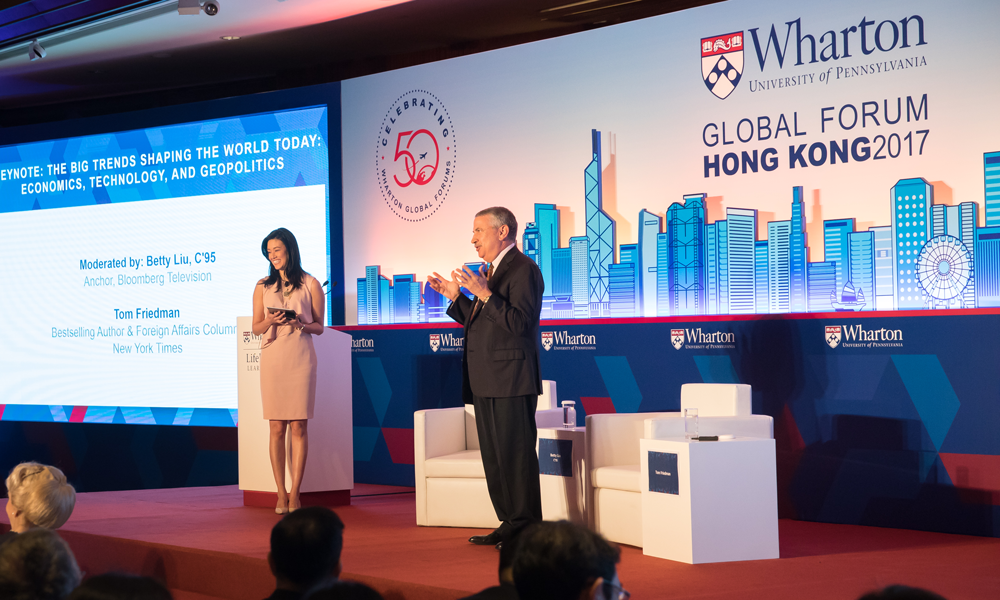
Speakers:
- Tom Friedman, Bestselling Author & Foreign Affairs Columnist, New York Times
- Betty Liu, C’95, Anchor, Bloomberg Television
Big Trends Shaping the World Today
“What keeps you up at night and what gives you the most hope?” Bloomberg’s Betty Liu asked Tom Friedman, bestselling author and New York Times columnist.
“We are seeing the end of truth. If we can’t agree on what is true, we are going down a terrible path,” Friedman said. All hope is not lost, though, as communities across America are banding together at the local level to adapt to change while Washington seems intractably paralyzed.
And while others forecast dark days with swaths of jobs lost to automation and increasing social isolation, Friedman predicts that our ability to marry the human connection with technological advances will spawn “STEMpathy jobs” that speak to something no machine can ever erase: the heart.
Our Bodies, Our Data, Our Future
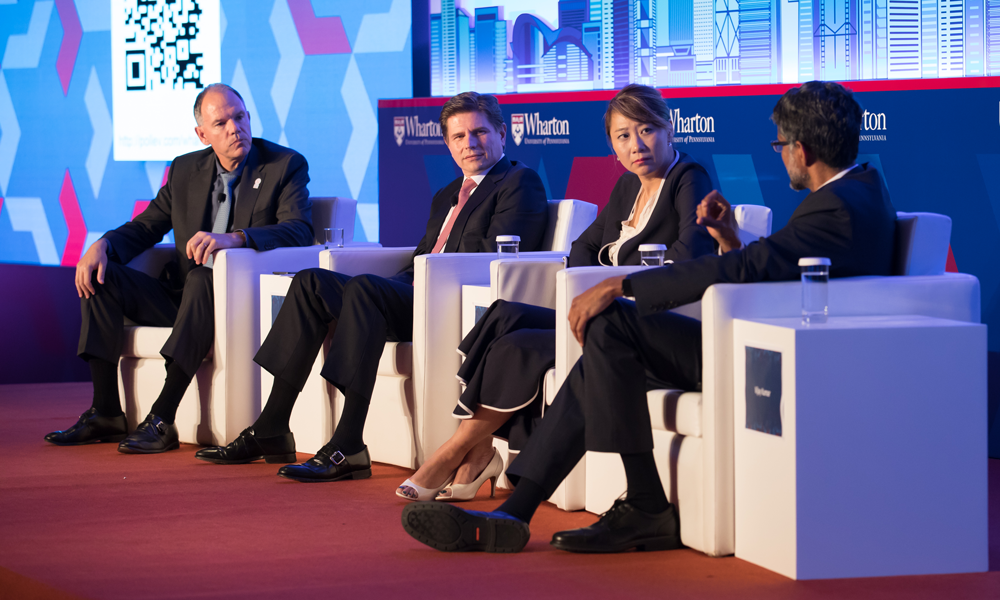
Speakers:
- Nicolas Aguzin, W’90, Chairman & Chief Executive Officer, J.P. Morgan, Asia Pacific
- Pascale Fung, Professor, Dept. of Electronic & Computer Engineering, Hong Kong University of Science & Technology
- Geoffrey Garrett, Dean and Reliance Professor of Management and Private Enterprise, and Professor of Management, The Wharton School
- Vijay Kumar, Nemirovsky Family Dean of Penn Engineering, University of Pennsylvania
Closing Plenary and Keynote: Engineering and the Future of Business
Our bodies are breathing databases, and machines are becoming better at detecting our moods, recording subtle movements and vocal inflections to offer us hyper-relevant goods and services. “Innovation will be where there is a lot of data, and there is a lot of data in big populations like China,” Pascale Fung said.
To stay competitive, global companies need to make enormous investments in technology; Aguzin said that JP Morgan has invested $3 billion in fintech applications and has automated 1.7 million processes this year alone. “Thousands of smart people coming out of college are ready to take a piece of that pie,” Aguzin said, “and they will.”
Those who devote themselves to continuous education will be the ones with the edge. “This idea of lifelong learning is something we need to drill into our students,” Vijay Kumar said. History majors need to take tech and business courses, and as employment rates for robots eclipse those for humans, ideas and talent will win the day.
 ASK A QUESTION
ASK A QUESTION